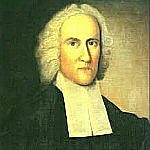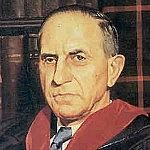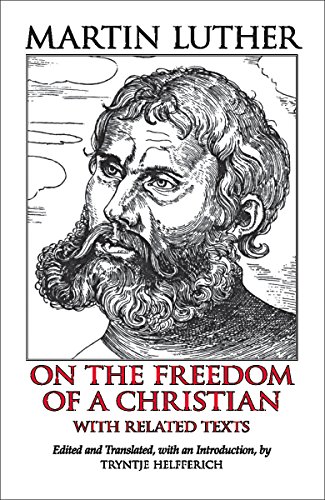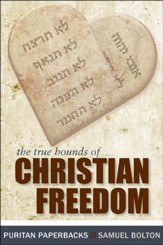Quotes about Liberty-Christian
Freedom in God’s world never comes apart from structure. When one is free to live as God intended, he is truly free indeed.
True liberty consists exactly in self-determination in the direction of holiness. Man is never more free than when he moves consciously in the direction of God.
Systematic Theology, by permission of Banner of Truth, Carlisle, PA. 1998, p. 548. Get this book!
Let us never surrender our judgments or our consciences to be at the disposal and opinions of others, and to be subjected to the sentences and determinations of men… It is my exhortation therefore to all Christians to maintain their Christian freedom by constant watchfulness. You must not be tempted or threatened out of it; you must not be bribed or frightened from it; you must not let either force or fraud rob you of it… We must not give up ourselves to the opinion of other men, though they be never so learned, never so holy, merely because it is their opinion. The apostle directs us to try all things and to hold fast that which is good (1 Thess. 5:21). It often happens that a high esteem of others in respect of their learning and piety makes men take up all upon trust from such, and to submit their judgments to their opinions, and their consciences to their precepts. This should not be so.
The True Bounds of Christian Freedom, 1978, p. 220-221, by permission Banner of Truth, Carlisle PA.
Aggravating all of these areas (of legalism) is a class of people who have come to be known as “controllers.” These are people who are not willing to let you live your life before God as you believe He is leading you. They have all the issues buttoned down and have cast-iron opinions about all of them. These people only know black and white. There are no gray areas to them. They insist you live your Christian life according to their rules and their opinions. If you insist on being free to live as God wants you to live, they will try to intimidate you and manipulate you one way or another. Their primary weapons are “guilt trips,” rejection, or gossip. These people must be resisted. We must not allow them to subvert the freedom we have in Christ.
Transforming Grace, NavPress, 1991, p. 130-131. Used by permission of NavPress – www.navpress.com. All rights reserved. Get this book!
Wherefore, though the Christian, as a Christian, is the only man at liberty, as called thereunto of God; yet his liberty is limited to things that are good: he is not licensed thereby to indulge the flesh.
A Puritan Golden Treasury, compiled by I.D.E. Thomas, by permission of Banner of Truth, Carlisle, PA. 2000, p. 168.
The moment any mention is made of Christian liberty lust begins to boil, or insane commotions arise, if a speedy restraint is not laid on those licentious spirits by whom the best things are perverted into the worst.
Let’s get rid of the inhuman philosophy which only allows necessities. Not only does it wrongly deprive us of legitimate enjoyment of God’s generosity, but it cannot be effected without depriving man of all his senses, reducing him to a block.
In the name of liberty professing Christians glut themselves with luxuries, entertainments and sensuous pleasures. Under the banner of freedom men give the reins to their thirst for wealth, women dress immodestly, feeding vanity which loves attention, and youth abandon themselves to athletics and leisure. When self is fed in this manner it becomes brazen and runs to excess, crowding God out of the heart… They begin again to serve themselves rather than the Lord.
The Shadow of the Cross – Studies in Self-Denial, 1981, p. 38, by permission Banner of Truth, Carlisle, PA.
Christian liberty then does not teach that there are things in the world in which you are free to indulge yourself. It does not suggest that you may do anything you wish with God’s creation. But it teaches that there are things which you are free to enjoy and use as you serve the Lord.
The Shadow of the Cross – Studies in Self-Denial, 1981, p. 41, by permission Banner of Truth, Carlisle, PA.
Liberty may be an instrument for giving glory to the Most High, or it may be a curtain used to shield base indulgence of the flesh (I Peter 2:16). You may discover by self-examination of your heart which function liberty serves in your life.
The Shadow of the Cross – Studies in Self-Denial, 1981, p. 43, by permission Banner of Truth, Carlisle, PA.
It is not enough to ask yourself, “Does God’s Word permit me to use these good things of the world?” You must also inquire, “Will it serve the glory of God?” and, “Will it edify my fellow Christians?”
The Shadow of the Cross – Studies in Self-Denial, 1981, p. 45, by permission Banner of Truth, Carlisle, PA.
We do need to guard against making absolutes out of personal standards that are not specified in Scripture, or assuming that others are sinning if they don’t adopt our standards about issues that may not be traps for them. But why are we so prone to defend choices that take us right to the edge of sin, and so reluctant to make radical choices to protect our hearts and minds from sin?
Holiness, The Heart God Purifies, Moody Publishers, p. 113. Get this book!
True liberty consists only in the power of doing what we ought to will, and in not being constrained to do what we ought not to will.
When free believers take their liberties too far and violate the commands of God or demonstrate a bent toward impiety because they wish to press the outer ranges of liberty, or when they laugh at piety as if it is beneath them, then they have stepped out of the spirit of true Christianity.
The Care and Feeding of Flies, Christian Communicators Worldwide, www.CCWtoday.org. Used by Permission.
Freedom is not only the principle in the Christian life. Freedom is for something. God has set us free for holiness. He has set us free from the guilt and bondage of sin – but not in order that we might become enslaved to the very sins for which Christ died to redeem us!… No action which is contrary to the plain Word of God can ever be legitimate for the Christian. No appeal to spiritual freedom or to providential circumstances can ever make what is ethically wrong anything else but sinful. For the Christian is free only to love and obey the law of God. Therein lies his true freedom.
Discovering God’s Will, By Permission of the Banner of Truth Trust, Carlisle, PA. 1991, p. 66.
To argue from mercy to sin is the devil’s logic.
A Puritan Golden Treasury, compiled by I.D.E. Thomas, by permission of Banner of Truth, Carlisle, PA. 2000, p. 168.
God’s purpose in redeeming men from sin is not to give them freedom to do as they please but freedom to do as He pleases, which is to live righteously.
If Christ loved the weak believer to the extent of laying down his life for his salvation, how alien to the demands of this love is the refusal on the part of the strong to forego the use of a certain article of food [or anything else] when the religious interests of the one for whom Christ died are thereby imperiled! It is the contrast between what the extreme sacrifice of Christ exemplified and the paltry demand devolving upon us that accentuates the meanness of our attitude when we discard the interests of a weak brother. And since the death of Christ as the price of redemption for all believers is the bond uniting them in fellowship, how contradictory is any behavior that is not patterned after the love which Christ’s death exhibited!
Man’s perennial efforts to take himself in hand, however he attempts it, lead to the greatest bondage in which man misses what he was meant to be. Man’s true freedom does not consist of the unfettered power to direct his life, either in a political or in a Stoic sense. It lies in life with God, lived as it was originally intended by God for man. He only gains this as he denies himself. Paradoxically, the free man does not belong to himself. He belongs to Him who has set him free (J. Blunck).
The New International Dictionary of New Testament Theology, v. 1, ed. Colin Brown, Zondervan, www.zondervan.com, 1971, p. 718.
Only what God has commanded in His word should be regarded as binding; in all else there may be liberty of actions.
Quoted by Sinclair B. Ferguson, John Owen on the Christian Life, The Banner of Truth Trust, 1987, p. 154.
Full freedom is what you have when no lack of opportunity, no lack of ability, and no lack of desire prevents you from doing what will make you happiest in a thousand years. In order to be free in the fullest sense you have to have opportunity, ability, and desire to do what will make you happy in a thousand years. Another way to say it would be that there are four kinds of freedom, or better, four stages of freedom on the way to the full freedom all of us long for: The freedom of opportunity to do what we can, the freedom of ability to do what we desire, and the freedom of desire to do what will bring us unending joy… Therefore, true Christians are the freest people in the world.
Hagar and Slavery vs. Sarah and Freedom, Galatians 4:21-31, May 22, 1983, Used by Permission, www.DesiringGod.org.
But what is the nature of our freedom [in Christ]? It is not release from all restraint. It is not license to indulge our sinful nature. Our freedom is the freedom to “serve one another in love” [Gal. 5:13]. It is possible to do so, because the Holy Spirit enables us to act in ways that are contrary to the natural impulses of our sinful nature. Walking by the Spirit, we are released from the old master that produces hatred, jealousy, fits of rage, envy, and such. We are released to be loving, patient, kind, faithful and good.
A toxic person wants to be your functional god. They want to make you more nervous about letting them down than you should be about letting God down. They will manipulate in a way that oftentimes you do not realize what’s happening. They wish to be lord over your life. You will find yourself centering your priorities, thoughts and actions around their agenda. Christ has come that we might ultimately serve Him. John 8:36, “So if the Son makes you free, you will be free indeed.” As a Christian, you are now free from the slavery to sin and even the slavery to sinful people. Christ strengthens and builds up. Toxic people (antichrists) weaken and tear down through their controlling tendencies.
The Christian is not free to do what the Bible forbids. Christian freedom does not entail the right to fornicate or to steal or to lie or to persist in an unforgiving attitude or to do anything else the Scriptures explicitly prohibit. And a person who lovingly points this out to you is not a legalist for having done so!
Legalism vs. Liberty, November 6, 2006, www.enjoyinggodministries.com. Used by Permission.
Christian liberty is itself a good thing. But when wrongly used, that is, in defiance of love and in disregard for the conscience of a weaker brother, it can bring disgrace on the gospel.
Liberty vs. Legalism, November 6, 2006, www.enjoyinggodministries.com. Used by Permission.
Christian liberty [also] may legitimately manifest itself in abstinence or asceticism. Christian liberty includes the right to abstain from otherwise legitimate pursuits if one is convinced in his/her own mind that such is the will of God for them personally. In other words, you may fully believe in the truth of Rom. 14:14a, yet choose to abstain anyway. Christian liberty does not include the right to insist that others likewise abstain simply because you do. Far less does it include the right to judge them as sub-spiritual for choosing a different course of action from you.
Liberty vs. Legalism, November 6, 2006, www.enjoyinggodministries.com. Used by Permission.
The conscience of the Christian is obligated and bound only by what the Bible either commands or forbids, or by what may be legitimately deduced from an explicit biblical principle.
In fundamentals…faith is primary, and we may not appeal to love as an excuse to deny essential faith. In non-fundamentals, however, love is primary, and we may not appeal to zeal for the faith as an excuse for failure in love. Faith instructs our own conscience; love respects the consciences of others. Faith gives liberty; love limits it exercise.
Romans – God’s Good News for the World, 1994, InterVarsity Christian Fellowship. Used with permission of InterVarsity Press UK, p. 252.
[Many things] are not specifically condemned by the Scriptures, and thus we must apply other criteria. For example, would these matters cause us to sin, or harm our bodies, or cause a brother to stumble, or tempt us to fall into a pattern we could not control? Clearly if those things occurred, then it would be wrong for us to do them. If not, then we have the liberty to enjoy these activities.
Practical Wisdom for Pastors, Crossway Books, 2001, p. 202. Used by Permission. Get this book!
We have not advanced very far in our spiritual lives if we have not encountered the basic paradox of freedom…that we are most free when we are bound. But not just any way of being bound will suffice; what matters is the character of our binding. The one who would be an athlete, but who is unwilling to discipline his body by regular exercise and by abstinence, is not free to excel on the field or the track. His failure to train rigorously denies him the freedom to run with the desired speed and endurance. With one concerted voice, the giants of the devotional life apply the same principle to the whole of life: Discipline is the price of freedom.
There are many activities that are perfectly legitimate for the believer. But if you want to be effective for Christ, you have to limit your liberty.
The bondage that liberates is a bondage to righteousness, a bondage to the will and ways of God, a bondage that claims as its Master and Lord the One whose holy and merciful character is now reproduced in us and through us. Our freedom to be what we were created to be consists, then, in our bondage to God and in nothing else.
The conscience of one should not “rule” another in areas of liberty, but love should prevail in every consideration, even if it means eliminating the exercise of certain liberties (e.g. Paul in 1 Cor. 8:12-13).
This is a very difficult issue. The Bible teaches that we are never to get into a situation in which our innocent behavior is “spoken of as evil” (Rom. 14:16). For example, if what we are doing, though not sinful, could misrepresent the Lord, His church, His people, or His truth, to the world, we should avoid it. Not only are we to build up less mature believers in the body, but we are also to have character that is above legitimate question in the eyes of unbelievers (1 Peter 2:12-24; 3:13-17; 4:15). Some things are not evil but can easily be associated with questionable elements of society or even worldliness. Remember, if Christian freedoms are truly “freedoms,” then we should be as ready and willing to give them up as enjoy them.
We must ask ourselves, “For me personally, is this something the Lord would be pleased with?” If we have any doubts we should not do it (Rom. 14:20-23). If you believe that the Lord’s will for your life would not be violated, then you’re free to proceed (Rom. 14:5). But be careful here: Paul warns us to be completely free from doubts. In other words, we should not be involved in some “gray” activity without having sought counsel, studied God’s Word, prayed, and scrutinized all possible pros and cons before proceeding. If important issues are bypassed and the conscience is violated, the result is sin (Rom. 14:23).
If you spend a good bit of time defending your “privilege” to exercise a Christian liberty, perhaps you ought to let go of it for a time as a means of testing your motives. Is it truly a “freedom?” If so, it should be easily dispensed with for the sake of maintaining integrity before the Lord.


























